- Home
- Frank Herbert
Eye Page 14
Eye Read online
Page 14
"Then the gestures, the sounds would tend to be ritual," she said.
"Mmmmm-hmmmm."
"Then... may we have the help to go into this idea the way it deserves?" she asked.
"I'll take it up at the next top staff meeting," said Langsmith. He got to his feet. "Don't get your hopes up. This'll have to be submitted to the electronic computers. It probably has been cross-checked and rejected in some other problem."
She looked up at him, dismayed. "But... Dr. Langsmith... a computer's no better than what's put into it. I'm certain that we're stepping out into a region here where we'll have to build up a whole new approach to language."
"Now, don't you worry, said Langsmith. He frowned. "No ... don't worry about this."
"Shall we go ahead with what we're doing then?" she asked. "I mean—do we have permission to?"
"Yes, yes... or course." Langsmith wiped his mouth with the back of his hand. "General Speidel has called a special meeting tomorrow morning. I'd like to have you attend. I'll send somebody to pick you up." He waved a hand at the litter around Francine. "Carry on, now." There was a pathetic emptiness to the way he put his pipe in his mouth and left the room. Francine stared at the closed door.
She felt herself trembling, and recognized that she was deathly afraid. Why? she asked herself. What have I sensed to make me afraid?
Presently, Ohashi came in carrying a paper bag.
"Saw Langsmith going out," he said. "What did he want?"
"He wanted to know what we're doing."
Ohashi paused before his chair. "Did you tell him?"
"Yes. I asked for help." She shook her head. "He wouldn't commit himself."
"I brought ham sandwiches," said Ohashi.
Francine's chin lifted abruptly. "Defeated!" she said. "That's it! He acted completed defeated!"
"What?"
"I've been trying to puzzle through the strange way Langsmith was acting. He just radiated defeat."
Ohashi handed her a sandwich. "Better brace yourself for a shock," he said. "I ran into Tsu Ong, liaison officer for our delegation... in the cafeteria." The Japanese raised the sandwich sack over his chair, dropped it into the seat with a curious air of preciseness. "The Russians are pressing for a combined attack on the Galactic ship to wrest their secret from them by force."
Francine buried her face in her hands. "The fools!" she whispered. "Oh, the fools!" Abruptly, sobs shook her. She found herself crying with the same uncontrollable racking that had possessed her when she'd learned of her husband's death.
Ohashi waited silently.
The tears subsided. Control returned. She swallowed, said: "I'm sorry."
"Do not be sorry." He put a hand on her shoulder. "Shall we knock off for the night?"
She put her hand over his, shook her head. "No. Let's look at the latest films from the ship."
"As you wish." Ohashi pulled away, threaded a new film into the projector.
Presently, the screen came alive to a blue-gray alcove filled with pale light: one of the "class" rooms in the spaceship. A squat, green-skinned figure stood in the center of the room. Beside the Galactic was the pedestal-footed projection board that all five used to illustrate their "lectures." The board displayed a scene of a wide blue lake, reeds along the shore stirring to a breeze.
The Galactic swayed. His face moved like a ripple of water. He said: "Ahon'atu'uklah'shoginai' eastruru." The green arms moved up and down, undulating. The webbed hands came out, palms facing and almost touching, began chopping from the wrists: up, down, up, down, up, down...
On the projection board the scene switched to an underwater view: myriad swimming shapes coming closer, closer—large-eyed fish creatures with long ridged tails.
"Five will get you ten," said Ohashi. "Those are the young of this Galactic race. Notice the ridge."
"Tadpoles," said Francine.
The swimming shapes darted through orange shadows and into a space of cold green—then up to splash on the surface, and again down into the cool green. It was a choreographic swinging, lifting, dipping, swaying—lovely in its synchronized symmetry.
"Chiruru'uklia'a'agudav'iaa," said the Galactic. His body undulated like the movements of the swimming creatures. The green hands touched his thighs, slipped upward until elbows were level with shoulders.
"The maiden in the Oriental dance," said Francine.
Now, the hands came out, palms up, in a gesture curiously suggestive of giving. The Galactic said: "Pluainumiuri!" in a single burst of sound that fell on their ears like an explosion.
"It's like a distorted version of the ritual dances we've been watching," said Ohashi.
"I've a hunch," said Francine. "Feminine intuition. The repeated vowels: They could be an adverbial emphasis, like our word very. Where it says 'a-a-a,' note the more intense gestures."
She followed another passage, nodding her head to the gestures. "Hiko, could this be a constructed language? Artificial?"
"The thought has occurred to me," said Ohashi.
Abruptly the projector light dimmed, the action slowed. All lights went out. They heard a dull, booming roar in the distance, a staccato rattling of shots. Feet pounded along the corridor outside the room.
Francine sat in stunned silence.
Ohashi said: "Stay here, please. I will have a look around to see what..."
The door banged open and a flashlight beam stabbed into the room, momentarily blinding them.
"Everything all right in here?" boomed a masculine voice.
They made out a white MP helmet visible behind the light.
"Yes," said Ohashi. "What is happening?"
"Somebody blew up a tower to the main transmission line from McNary Dam. Then there was an attempt to breach our security blockade on the south. Everything will be back to normal shortly." The light turned away.
"Who?" asked Francine.
"Some crazy civilians," said the MP. "We'll have the emergency power on in a minute. Just stay in this room until we give the all-clear." He left, closing the door.
They heard a rattle of machine-gun fire. Another explosion shook the building. Voices shouted.
"We are witnessing the end of a world," said Ohashi.
"Our world ended when that spaceship set down here," she said.
Abruptly the lights came on: dimly, then brighter. The projector resumed its whirring. Ohashi turned it off.
Somebody walked down the corridor outside, rapped on the door, said: "All clear." The footsteps receded down the hall, and they heard another rapping, a fainter "All clear."
"Civilians," she said. "What do you supposed they wanted so desperately to do a thing like that?"
"They are a symptom of the general sickness," said Ohashi. "One way to remove a threat is to destroy it—even if you destroy yourself in the process. These civilians are only a minor symptom."
"The Russians are the big symptom then," she said.
"Every major government is a big symptom right now," he said.
"I... I think I'll get back to my room," she said. "Let's take up again tomorrow morning. Eight o'clock all right?"
"Quite agreeable," said Ohashi. "If there is a tomorrow."
"Don't you get that way, too," she said, and she took a quavering breath. "I refuse to give up."
Ohashi bowed. He was suddenly very Oriental. "There is a primitive saying of the Ainu," he said: The world ends every night ... and begins anew every morning."
It was a room dug far underground beneath the Ordnance Depot, originally for storage of atomics. The walls were lead. It was an oblong space: about thirty by fifteen feet, with a very low ceiling. Two trestle tables had been butted end-to-end in the center of the room to form a single long surface. A series of green-shaded lights suspended above this table gave the scene an odd resemblance to a gambling room. The effect was heightened by the set look to the shoulders of the men sitting in spring-bottom chairs around the table. There was a scattering of uniforms: Air Force, Army, Marines; plus hard-faced civilians in exp
ensive suits.
Dr. Langsmith occupied a space at the middle of one of the table's sides and directly across from the room's only door. His gnome features were locked in a frown of concentration. He puffed rhythmically at the stubby pipe like a witchman creating an oracle smoke.
A civilian across the table from Langsmith addressed a two- star general seated beside the team chief: "General Speidel, I think this is too delicate a spot to risk a woman."
Speidel grunted. He was a thin man with a high, narrow face: an aristocratic face that radiated granite convictions and stubborn pride. There was an air about him of spring steel under tension and vibrating to a chord that dominated the room.
"Our choice is limited," said Langsmith. "Very few of our personnel have consistently taken wheeled carts into the ship and consistently taken a position close to that force barrier or whatever it is."
Speidel glanced at his wristwatch. "What's keeping them?"
"She may already have gone to breakfast," said Langsmith.
"Be better if we got her in here hungry and jumpy," said the civilian.
"Are you sure you can handle her, Smitty?" asked Speidel.
Langsmith took his pipe from his mouth, peered into the stem as though the answer were to be found there. "We've got her pretty well analyzed," he said. "She's a recent widow, you know. Bound to still have a rather active death wish structure."
There was a buzzing of whispered conversation from a group of officers at one end of the table. Speidel tapped his fingers on the arm of his chair.
Presently the door opened. Francine entered. A hand reached in from outside, closed the door behind her.
"Ah, there you are, Dr. Millar," said Langsmith. He got to his feet. There was a scuffling sound around the table as the others arose. Langsmith pointed to an empty chair diagonally across from him. "Sit down, please."
Francine advanced into the light. She felt intimidated, knew she showed it, and the realization filled her with a feeling of bitterness tinged with angry resentment. The ride down the elevator from the surface had been an experience she never wanted to repeat. It had seemed many times longer than it actually was—like a descent into Dante's Inferno.
She nodded to Langsmith, glanced covertly at the others, took the indicated chair. It was a relief to get the weight off her trembling knees, and she momentarily relaxed, only to tense up again as the others resumed their seats. She put her hands on the table, immediately withdrew them to hold them clasped tightly in her lap.
"Why was I brought here like a prisoner?" she demanded.
Langsmith appeared honestly startled. "But I told you last night that I'd send somebody for you."
Speidel chuckled easily. "Some of our Security boys are a little grim-faced" he said. "I hope they didn't frighten you."
She took a deep breath, began to relax. "Is this about the request I made last night?" she asked. "I mean, for help in this new line of research?"
"In a way," said Langsmith. "But first I'd like to have you answer a question for me." He pursed his lips. "Uh... I've never asked one of my people for just a wild guess before, but I'm going to break that rule with you. What's your guess as to why these Galactics are here?"
"Guess?"
Logical assumption, then," he said.
She looked down at her hands. "We've all speculated, of course. They might be scientists investigating us for reasons of their own."
"Damnation!" barked the civilian beside her. Then: "Sorry, ma'am. But that's the pap we keep using to pacify the public."
"And we aren't keeping them very well pacified," said Langsmith. "That group that stormed us last night called themselves the Sons of Truth! They had thermite bombs, and were going to attack the spaceship."
"How foolish," she whispered. "How pitiful."
"Go on with your guessing, Dr. Millar," said Speidel.
She glanced at the general, again looked at her hands. "There's the military's idea—that they want Earth for a strategic base in some kind of space war."
"It could be," said Speidel.
"They could be looking for more living space for their own kind," she said.
"In which case, what happens to the native population?" asked Langsmith.
"They would either be exterminated or enslaved, I'm afraid. But the Galactics could be commercial traders of some sort, interested in our art forms, our animals for their zoos, our archaeology, our spices, our..." She broke off, shrugged. "How do we know what they may be doing on the side... secretly?"
"Exactly!" said Speidel. He glanced sidelong at Langsmith. "She talks pretty level-headed, Smitty."
"But I don't believe any of these things," she said.
"What is it you believe?" asked Speidel.
"I believe they're just what they represent themselves to be— representatives of a powerful Galactic culture that is immeasurably superior to our own."
"Powerful, all right!" It was a marine officer at the far end of the table. "The way they cleaned off Eniwetok and swept our satellites out of the skies!"
"Do you think there's a possibility they could be concealing their true motives?" asked Langsmith.
"A possibility, certainly."
"Have you ever watched a confidence man in action?" asked Langsmith.
"I don't believe so. But you're not seriously suggesting that these..." She shook her head. "Impossible."
"The mark seldom gets wise until it's too late," said Langsmith.
She looked puzzled. "Mark?"
"The fellow the confidence men choose for a victim." Langsmith relighted his pipe, extinguished the match by shaking it. Dr. Millar, we have a very painful disclosure to make to you."
She straightened, feeling a sudden icy chill in her veins at the stillness in the room.
"Your husband's death was not an accident," said Langsmith.
She gasped, and turned deathly pale.
"In the six months before this spaceship landed, there were some twenty-eight mysterious deaths," said Langsmith. "More than that, really, because innocent bystanders died, too. These accidents had a curious similarity: In each instance there was a fatality of a foremost expert in the field of language, cryptoanalysis, semantics..."
"The people who might have solved this problem died before the problem was even presented," said Speidel. "Don't you think that's a curious coincidence?"
She was unable to speak.
"In one instance there was a survivor," said Langsmith. "A British jet transport crashed off Ceylon, killing Dr. Ramphit U. The lone survivor, the co-pilot, said a brilliant beam of light came from the sky overhead and sliced off the port wing. Then it cut the cabin in half!"
Francine put a hand to her throat. Langsmith's cautious hand movements suddenly fascinated her.
"Twenty-eight air crashes?" she whispered.
"No. Two were auto crashes." Langsmith puffed a cloud of smoke before his face.
Her throat felt sore. She swallowed, said: "But how can you be sure of that?"
"It's circumstantial evidence, yes," said Speidel. He spoke with thin-lipped precision. "But there's more. For the past four months all astronomical activity of our nation has been focused on the near heavens, including the moon. Our attention was drawn to evidence of activity near the moon crater Theophilus. We have been able to make out the landing rockets of more than five hundred spacecraft!"
"What do you think of that?" asked Langsmith. He nodded behind his smokescreen.
She could only stare at him; her lips ashen.
"These frogs have massed an invasion fleet on the moon!" snapped Speidel. "It's obvious!"
They're lying to me! she thought. Why this elaborate pretense? She shook her head, and something her husband had once said leapt unbidden into her mind: "Language clutches at us with unseen fingers. It conditions us to the way others are thinking. Through language, we impose upon each other our ways of looking at things."
Speidel leaned forward. "We have more than a hundred atomic warheads aimed at that
moon-base! One of those warheads will do the job if it gets through!" He hammered a fist on the table. "But first we have to capture this ship here!"
Why are they telling me all this? she asked herself. She drew in a ragged breath, said: "Are you sure you're right?"
"Of course we're sure!" Speidel leaned back, lowered his voice. "Why else would they insist we learn their language? The first thing a conqueror does is impose his language on his new slaves!"
"No... no, wait," she said. "That only applies to recent history. You're getting language mixed up with patriotism because of our own imperial history. Bob always said that such misconceptions are a serious hindrance to sound historical scholarship."
"We know what we're talking about, Dr. Millar," said Speidel.
"You're suspicious of language because our imperialism went hand in hand with our language," she said.
Speidel looked at Langsmith. "You talk to her."
"If there actually were communication in the sounds these Galactics make, you know we'd have found it by now," said Langsmith. "You know it!"
She spoke in sudden anger: "I don't know it! In fact, I feel that we're on the verge of solving their language with this new approach we've been working on."
"Oh, come now!" said Speidel. "Do you mean that after our finest cryptographers have worked over this thing for seven months, you disagree with them entirely?"
"No, no, let her say her piece," said Langsmith.
"We've tapped a new source of information in attacking this problem," she said. "Primitive dances."
"Dances?" Speidel looked shocked.
"Yes. I think the Galactics' gestures may be their adjectives and adverbs—the full emotional content of their language."
"Emotion!" snapped Speidel. "Emotion isn't language!"
She repressed a surge of anger, said: "We're dealing with something completely outside our previous experience. We have to discard old ideas. We know that the habits of a native tongue set up a person's speaking responses. In fact you can define language as the system of habits you reveal when you speak."
Speidel tapped his fingers on the table, stared at the door behind Francine.
She ignored his nervous distraction, said: "The Galactics use almost the full range of implosive and glottal stops with a wide selection of vowel sounds: fricatives, plosives, voiced and unvoiced. And we note an apparent lack of the usual interfering habits you find in normal speech."

 Direct Descent
Direct Descent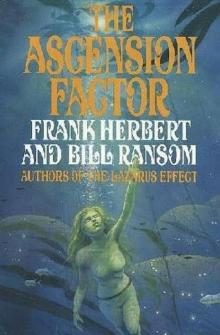 The Ascension Factor
The Ascension Factor The Heaven Makers
The Heaven Makers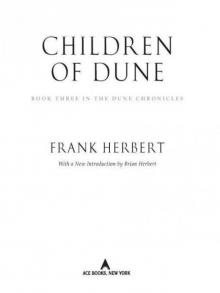 Children of Dune
Children of Dune Old Rambling House
Old Rambling House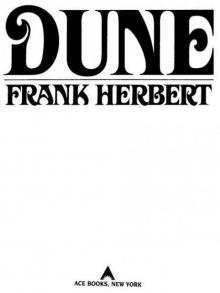 Dune
Dune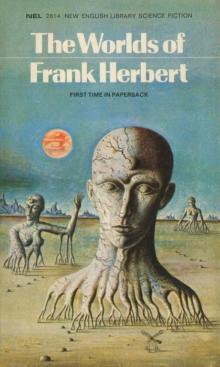 The Worlds of Frank Herbert
The Worlds of Frank Herbert The Jesus Incident
The Jesus Incident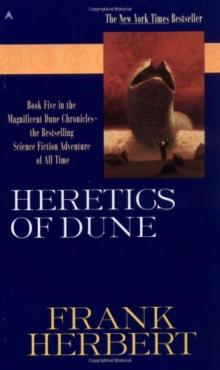 Heretics of Dune
Heretics of Dune Whipping Star
Whipping Star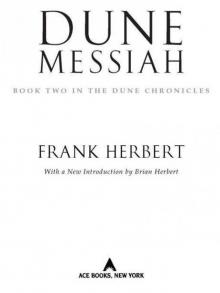 Dune Messiah
Dune Messiah Man of Two Worlds
Man of Two Worlds The Book of Frank Herbert
The Book of Frank Herbert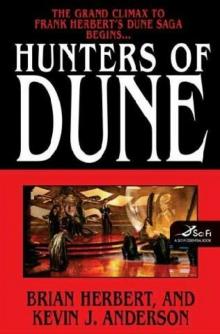 Hunters Of Dune
Hunters Of Dune The Tactful Saboteur
The Tactful Saboteur Soul Catcher
Soul Catcher God Emperor of Dune
God Emperor of Dune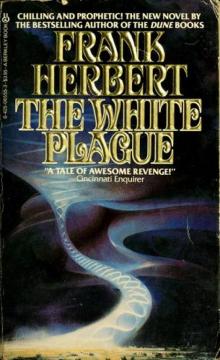 The White Plague
The White Plague The Green Brain
The Green Brain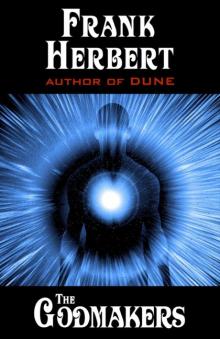 The Godmakers
The Godmakers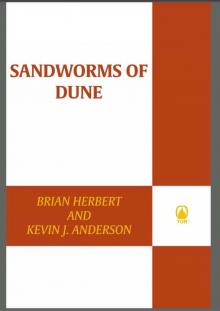 Sandworms of Dune
Sandworms of Dune Destination Void
Destination Void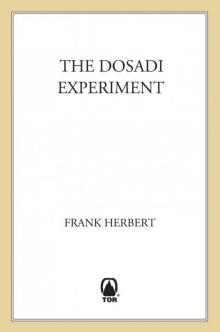 The Dosadi Experiment
The Dosadi Experiment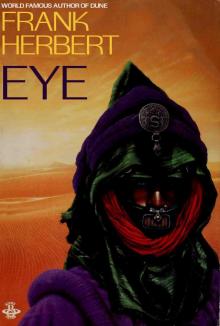 Eye
Eye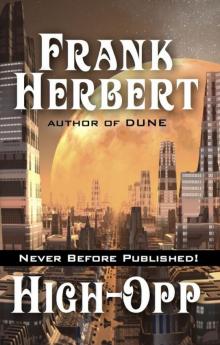 High-Opp
High-Opp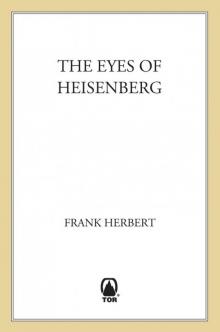 The Eyes of Heisenberg
The Eyes of Heisenberg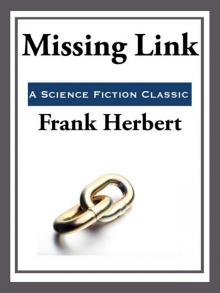 Missing Link
Missing Link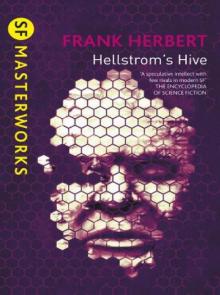 Hellstrom's Hive
Hellstrom's Hive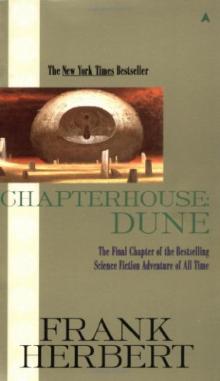 Chapterhouse: Dune
Chapterhouse: Dune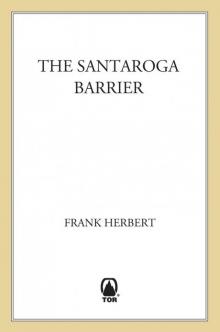 The Santaroga Barrier
The Santaroga Barrier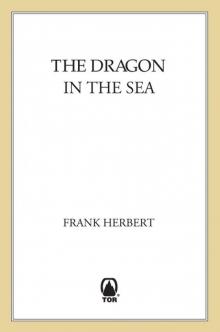 The Dragon in the Sea
The Dragon in the Sea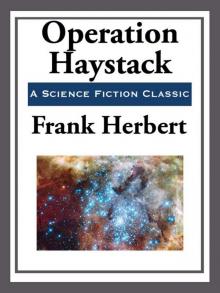 Operation Haystack
Operation Haystack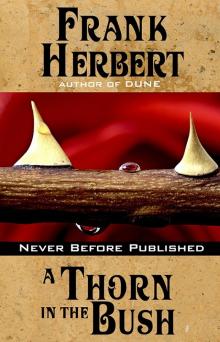 A Thorn in the Bush
A Thorn in the Bush Four Unpublished Novels
Four Unpublished Novels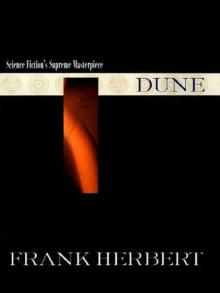 Dune dc-1
Dune dc-1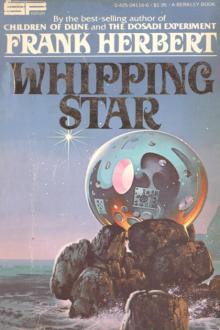 Jorj X. McKie 1 - Whipping Star
Jorj X. McKie 1 - Whipping Star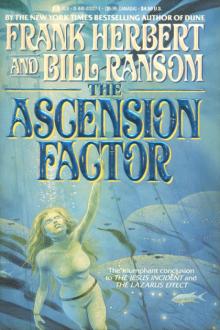 DV 4 - The Ascension Factor
DV 4 - The Ascension Factor Frank Herbert - Dune Book 4 - God Emperor Of Dune
Frank Herbert - Dune Book 4 - God Emperor Of Dune ChapterHouse: Dune dc-6
ChapterHouse: Dune dc-6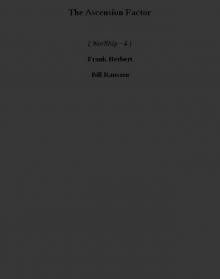 The Ascension Factor w-4
The Ascension Factor w-4 A Game of Authors
A Game of Authors Children of Dune dc-3
Children of Dune dc-3 Destination: Void: Prequel to the Pandora Sequence
Destination: Void: Prequel to the Pandora Sequence The Collected Stories of Frank Herbert
The Collected Stories of Frank Herbert Dune Messiah dc-2
Dune Messiah dc-2 Frank Herbert - Dune Book 5 - Heretics of Dune
Frank Herbert - Dune Book 5 - Heretics of Dune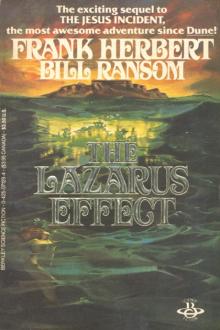 DV 3 - The Lazarus Effect
DV 3 - The Lazarus Effect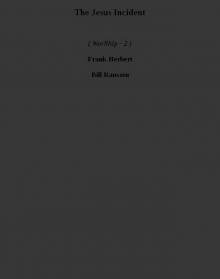 The Jesus Incident w-2
The Jesus Incident w-2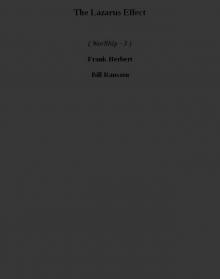 The Lazarus Effect w-3
The Lazarus Effect w-3 Frank Herbert
Frank Herbert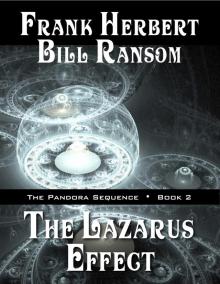 The Ascension Factor: Pandora Sequence
The Ascension Factor: Pandora Sequence Dune (40th Anniversary Edition)
Dune (40th Anniversary Edition)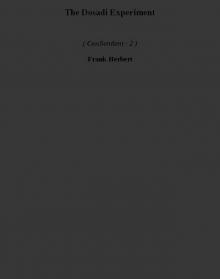 The Dosadi Experiment c-2
The Dosadi Experiment c-2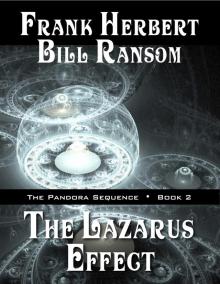 The Lazarus Effect
The Lazarus Effect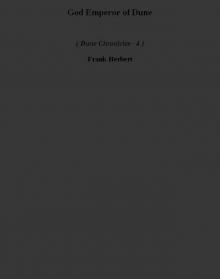 God Emperor of Dune dc-4
God Emperor of Dune dc-4 The Pandora Sequence: The Jesus Incident, the Lazarus Effect, the Ascension Factor
The Pandora Sequence: The Jesus Incident, the Lazarus Effect, the Ascension Factor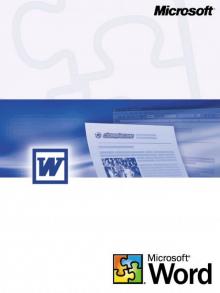 The Green Brain (v4.0)
The Green Brain (v4.0)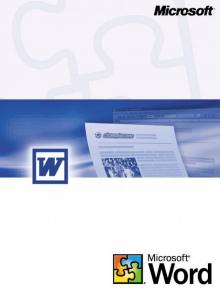 The Heaven Makers (v4.0)
The Heaven Makers (v4.0) Heretics of Dune dc-5
Heretics of Dune dc-5